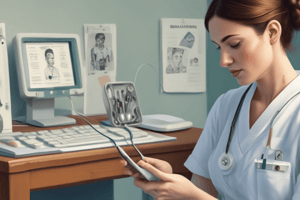Podcast
Questions and Answers
Identify and describe the phases of the clinical reasoning cycle.
Identify and describe the phases of the clinical reasoning cycle.
The phases of the clinical reasoning cycle are Consider the patient situation, Collect cues and information, Process the information, Identify problems, Establish goals, Take action, Evaluate outcomes, and Reflect on the process.
Define clinical reasoning and describe the competencies that promote the development of clinical reasoning skills.
Define clinical reasoning and describe the competencies that promote the development of clinical reasoning skills.
Clinical reasoning is the cognitive process used by healthcare professionals to gather and analyze patient information, evaluate the significance of this information, and make decisions. Competencies that promote the development of clinical reasoning skills include critical thinking, problem-solving, effective communication, and evidence-based practice.
Explain how the SBN values can be incorporated in the clinical reasoning process.
Explain how the SBN values can be incorporated in the clinical reasoning process.
SBN values, such as empowerment, collaboration, and hope, can be incorporated into the clinical reasoning process by guiding nurses to consider the strengths and resources of the patient and family, fostering partnerships, and promoting a positive outlook in the decision-making process.
Describe how the use of clinical reasoning, nursing knowledge, and other evidence informs decision-making in diverse practice situations.
Describe how the use of clinical reasoning, nursing knowledge, and other evidence informs decision-making in diverse practice situations.
Signup and view all the answers
Explain the ISoN Nursing Process and its emphasis on communication and clinical reasoning in patient care.
Explain the ISoN Nursing Process and its emphasis on communication and clinical reasoning in patient care.
Signup and view all the answers
What is the goal of the nursing analysis phase in the ISoN Nursing Process?
What is the goal of the nursing analysis phase in the ISoN Nursing Process?
Signup and view all the answers
In the case scenario of Mr. Patch, what health problems were identified during the assessment phase?
In the case scenario of Mr. Patch, what health problems were identified during the assessment phase?
Signup and view all the answers
What is the identified health problem for Mr. Patch in the case scenario, and what is the goal related to this problem?
What is the identified health problem for Mr. Patch in the case scenario, and what is the goal related to this problem?
Signup and view all the answers
How are interventions in the ISoN Nursing Process linked to the priority health problem?
How are interventions in the ISoN Nursing Process linked to the priority health problem?
Signup and view all the answers
What are the anticipated outcomes for Mr. Patch in the case scenario, and what further action may be needed?
What are the anticipated outcomes for Mr. Patch in the case scenario, and what further action may be needed?
Signup and view all the answers
What resources are mentioned in the text related to the professional examination of nurses in Quebec?
What resources are mentioned in the text related to the professional examination of nurses in Quebec?
Signup and view all the answers
What literature is referenced in the text on critical thinking and clinical judgment in nursing?
What literature is referenced in the text on critical thinking and clinical judgment in nursing?
Signup and view all the answers
Explain the approach used by the ISON for clinical decision making and how it is guided.
Explain the approach used by the ISON for clinical decision making and how it is guided.
Signup and view all the answers
List the stages involved in the Clinical Reasoning Cycle.
List the stages involved in the Clinical Reasoning Cycle.
Signup and view all the answers
How can assumptions based on age, culture, gender, and biases affect clinical reasoning, and what are nurses encouraged to do during the Clinical Reasoning Cycle?
How can assumptions based on age, culture, gender, and biases affect clinical reasoning, and what are nurses encouraged to do during the Clinical Reasoning Cycle?
Signup and view all the answers
What competencies facilitate a nurse's clinical reasoning skills according to the text?
What competencies facilitate a nurse's clinical reasoning skills according to the text?
Signup and view all the answers
Explain the purpose and key steps involved in Clinical Reasoning as mentioned in the text.
Explain the purpose and key steps involved in Clinical Reasoning as mentioned in the text.
Signup and view all the answers
How is the ISoN Nursing Process guided when choosing interventions and actions?
How is the ISoN Nursing Process guided when choosing interventions and actions?
Signup and view all the answers
What are the seven steps involved in Evidence-Based Practice (EBP) according to the text?
What are the seven steps involved in Evidence-Based Practice (EBP) according to the text?
Signup and view all the answers
What are the criteria that EBP interventions should meet to inform clinical practice, as mentioned in the text?
What are the criteria that EBP interventions should meet to inform clinical practice, as mentioned in the text?
Signup and view all the answers
Name three key emphases of the ISoN Nursing Process according to the text.
Name three key emphases of the ISoN Nursing Process according to the text.
Signup and view all the answers
Provide the references for the information related to the Clinical Reasoning Cycle, Evidence-Based Practice, and Strengths-based nursing care as mentioned in the text.
Provide the references for the information related to the Clinical Reasoning Cycle, Evidence-Based Practice, and Strengths-based nursing care as mentioned in the text.
Signup and view all the answers
What is the approach used for documenting and orally transmitting the Nursing Process at ISON, as stated in the text?
What is the approach used for documenting and orally transmitting the Nursing Process at ISON, as stated in the text?
Signup and view all the answers
What are the resources related to the ISoN Nursing Process and Clinical Conversations in nursing education, as mentioned in the text?
What are the resources related to the ISoN Nursing Process and Clinical Conversations in nursing education, as mentioned in the text?
Signup and view all the answers
Study Notes
Nursing Process and Clinical Reasoning Cycle Summary
- The Nursing Process used at the ISON (Ingram School of Nursing) utilizes the Clinical Reasoning Cycle (CRC) to facilitate clinical decision making guided by Evidence-based Nursing Practice (EBNP).
- The process incorporates the Strengths-Based Nursing (SBN) approach and is documented and orally transmitted using language adapted for interprofessional communication.
- The Clinical Reasoning Cycle involves stages such as considering the patient situation, cultivating curiosity, processing information and evidence, evaluating practice change, and evaluating outcomes.
- Assumptions based on age, culture, gender, and biases can lead to clinical reasoning errors, and nurses are encouraged to question these assumptions during the Clinical Reasoning Cycle.
- Competencies that facilitate a nurse's clinical reasoning skills include knowledge in nursing and related disciplines, skills in observation and communication, and attitudes like curiosity and self-awareness.
- Clinical Reasoning is a purposeful thinking process focused on patient care, involving collecting cues and information, considering the patient situation, processing information, identifying problems, establishing goals, taking action, and evaluating outcomes.
- The process is guided by SBN values specific to ISoN, incorporating the best available evidence when choosing interventions and actions.
- Evidence-Based Practice (EBP) involves seven steps, including cultivating curiosity, asking answerable questions, searching for evidence, appraising evidence, integrating evidence into practice, evaluating practice change, and disseminating results of evaluation.
- EBP interventions should be relevant, valid, reliable, and applicable to the clinical question to inform clinical practice.
- The ISoN Nursing Process also emphasizes collaboration with patients, strengths-based care, and involvement of patients in the Clinical Reasoning Cycle.
- The provided links lead to resources related to the ISoN Nursing Process and Clinical Conversations in nursing education.
- The references for the information provided include Levett-Jones et al. (2010) for the Clinical Reasoning Cycle, Melnyk, Fineout-Overholt, Stillwell, and Williamson for Evidence-Based Practice, and Gottlieb & Gottlieb (2012) for Strengths-based nursing care.
Studying That Suits You
Use AI to generate personalized quizzes and flashcards to suit your learning preferences.
Related Documents
Description
Test your knowledge of the Nursing Process and Clinical Reasoning Cycle at the ISON with this quiz. Explore key concepts such as Evidence-Based Nursing Practice, Strengths-Based Nursing approach, and the stages of the Clinical Reasoning Cycle. Assess your understanding of competencies and interventions that facilitate clinical reasoning skills, and learn about the importance of collaboration and patient involvement in the process.




